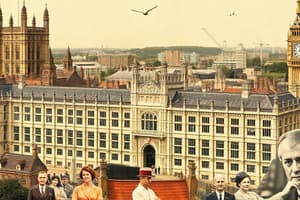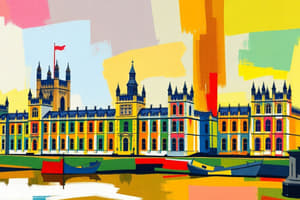Podcast
Questions and Answers
The Act of Union in 1707 solely merged the monarchies of England and Scotland, without affecting their parliaments.
The Act of Union in 1707 solely merged the monarchies of England and Scotland, without affecting their parliaments.
False (B)
The Sepoy Mutiny of 1857 led to the British Crown establishing direct rule over India, marking a significant shift in colonial administration.
The Sepoy Mutiny of 1857 led to the British Crown establishing direct rule over India, marking a significant shift in colonial administration.
True (A)
The Industrial Revolution in the UK began in the late 16th century, driven by advancements in maritime technologies.
The Industrial Revolution in the UK began in the late 16th century, driven by advancements in maritime technologies.
False (B)
During its imperial era, the UK primarily focused on cultural exchange rather than economic exploitation of its colonies.
During its imperial era, the UK primarily focused on cultural exchange rather than economic exploitation of its colonies.
Following World War II, nationalist movements in British colonies were largely suppressed, preventing any significant decolonization until the 1980s.
Following World War II, nationalist movements in British colonies were largely suppressed, preventing any significant decolonization until the 1980s.
The Roman Empire's influence on Britain ended abruptly in 43 AD with the Germanic invasions.
The Roman Empire's influence on Britain ended abruptly in 43 AD with the Germanic invasions.
The Kingdom of Great Britain was formed in 1800 with the merger of England, Scotland, and Ireland.
The Kingdom of Great Britain was formed in 1800 with the merger of England, Scotland, and Ireland.
The British Empire began its expansion in the late 16th century, driven by economic interests and the desire to spread British culture.
The British Empire began its expansion in the late 16th century, driven by economic interests and the desire to spread British culture.
The UK remained neutral during both World War I and World War II, focusing on domestic issues, and avoiding international conflicts.
The UK remained neutral during both World War I and World War II, focusing on domestic issues, and avoiding international conflicts.
Post-Brexit, the UK has strengthened its ties with the European Union, participating in most of its economic policies.
Post-Brexit, the UK has strengthened its ties with the European Union, participating in most of its economic policies.
Britain gained complete control over Ireland through a swift and peaceful agreement in the 15th century.
Britain gained complete control over Ireland through a swift and peaceful agreement in the 15th century.
The Norman Conquest of 1066 had minimal impact on English society, language, and law.
The Norman Conquest of 1066 had minimal impact on English society, language, and law.
England and Scotland have always been a unified kingdom, with no prior history as separate states.
England and Scotland have always been a unified kingdom, with no prior history as separate states.
Victory in the Seven Years' War (1756-1763) diminished Britain's position as a dominant colonial power.
Victory in the Seven Years' War (1756-1763) diminished Britain's position as a dominant colonial power.
The UK is currently a monocultural society with a homogenous economy.
The UK is currently a monocultural society with a homogenous economy.
Prehistoric Britain was primarily inhabited by Romans who established permanent settlements and infrastructure.
Prehistoric Britain was primarily inhabited by Romans who established permanent settlements and infrastructure.
The Wars of the Roses were a series of international conflicts fought between England and France during the 15th century.
The Wars of the Roses were a series of international conflicts fought between England and France during the 15th century.
Canada, Australia, New Zealand, and South Africa were directly ruled by the British government without any local autonomy.
Canada, Australia, New Zealand, and South Africa were directly ruled by the British government without any local autonomy.
The primary motivation for British colonization was to promote democratic governance and human rights in the territories they occupied.
The primary motivation for British colonization was to promote democratic governance and human rights in the territories they occupied.
The Hundred Years' War was fought exclusively between England and Scotland for control over the British Isles.
The Hundred Years' War was fought exclusively between England and Scotland for control over the British Isles.
Flashcards
Anglo-Saxon Period
Anglo-Saxon Period
A period in British history following the Roman withdrawal and characterized by the migration and settlement of Germanic tribes.
Norman Conquest
Norman Conquest
The invasion of England in 1066 by William the Conqueror, profoundly impacting English society, language, and law.
Wars of the Roses
Wars of the Roses
Series of civil wars in 15th-century England for the throne, ultimately won by the House of Tudor.
Act of Union 1707
Act of Union 1707
Signup and view all the flashcards
Act of Union 1800
Act of Union 1800
Signup and view all the flashcards
Industrial Revolution
Industrial Revolution
Signup and view all the flashcards
British Empire: Origins
British Empire: Origins
Signup and view all the flashcards
Expansion and Dominance
Expansion and Dominance
Signup and view all the flashcards
India
India
Signup and view all the flashcards
Dominions
Dominions
Signup and view all the flashcards
Impact of the Empire
Impact of the Empire
Signup and view all the flashcards
World Wars
World Wars
Signup and view all the flashcards
Decolonization
Decolonization
Signup and view all the flashcards
European Union
European Union
Signup and view all the flashcards
Study Notes
- The history of the UK is complex, involving the merging of different kingdoms and cultures over centuries
- It is strongly tied to the history of the British Empire, which expanded British influence globally
Early History
- Prehistoric Britain was inhabited by various groups, including those who built Stonehenge
- The Roman Empire invaded in 43 AD, establishing the province of Britannia
- Roman rule lasted until the early 5th century, after which various Germanic tribes, including the Angles, Saxons, and Jutes, migrated to Britain
- These groups formed several kingdoms, leading to what is known as the Anglo-Saxon period
Medieval Period
- The Anglo-Saxon kingdoms eventually unified into the Kingdom of England
- In 1066, William the Conqueror of Normandy invaded and defeated the English at the Battle of Hastings
- The Norman conquest had a profound impact on English society, language, and law
- England expanded its territory, including Wales
- Conflict with France was common, including the Hundred Years' War
- The Wars of the Roses were a series of civil wars for the English throne in the 15th century, with the House of Tudor eventually victorious
The Act of Union 1707
- Scotland and England were separate states previously
- Despite sharing a monarch from 1603 onwards
- The Act of Union 1707 unified the parliaments
- Created the Kingdom of Great Britain
Formation of United Kingdom
- Ireland was gradually brought under English control, a process that spanned centuries
- The Act of Union 1800 merged the Kingdom of Great Britain and the Kingdom of Ireland
- Created the United Kingdom of Great Britain and Ireland
Industrial Revolution
- The UK was the birthplace of the Industrial Revolution, starting in the late 18th century
- New technologies, such as the steam engine and power loom, transformed manufacturing and transportation
- This led to significant economic growth, urbanization, and social changes
The British Empire: Origins
- Began in the late 16th century
- England established colonies and trade posts across the globe
- Motivated by economic opportunities, strategic interests, and a desire to spread British culture and influence
Expansion and Dominance
- During the 17th and 18th centuries, the British Empire expanded significantly
- Colonies were established in North America, the Caribbean, and India
- Britain became a major player in the transatlantic slave trade
- Victory in the Seven Years' War (1756-1763) solidified Britain's position as a dominant colonial power
Key Colonies and Territories
- India: Became the "jewel in the crown" of the British Empire
- Direct rule was established after the Sepoy Mutiny of 1857
- Canada, Australia, New Zealand, and South Africa: Gained self-governance as dominions within the Empire
- Various colonies in Africa: Acquired during the "Scramble for Africa" in the late 19th century
Impact of the Empire
- Economic: Provided access to raw materials and markets
- Cultural: Spread the English language, legal systems, and political institutions
- Negative aspects: Exploitation of resources and people, suppression of local cultures, and forced labor
World Wars
- The UK played a crucial role in both World War I and World War II
- Allied with France, Russia, and later the United States against Germany and its allies
- Faced significant economic and social challenges during and after the wars
Decolonization
- The 20th Century saw the dismantling of the British Empire
- Nationalist movements grew in many colonies after World War II
- India gained independence in 1947, setting off a wave of decolonization
- Most colonies gained independence by the 1960s
Post-Imperial UK
- Joined the European Economic Community (later the European Union) in 1973
- Debated its relationship with Europe
- Voted to leave the EU in 2016 (Brexit)
Modern UK
- A leading member of international organizations such as the United Nations and NATO
- A multicultural society with a diverse economy
- Faces challenges related to globalization, immigration, and social inequality
Studying That Suits You
Use AI to generate personalized quizzes and flashcards to suit your learning preferences.




